After five years of operations in Nigeria’s rapidly evolving non-interest banking (NIB) space, TAJBank Limited has been adjudged a leading player in the subsector based on its total assets and gross earnings values.
At a seminar in Abuja focused on non-interest banks’ roles in financing small and medium enterprises (SMEs), investment expert Olabode Akeredolu-Ale ranked TAJBank Limited as the top non-interest bank in Nigeria based on a five-year performance review.
According to Akeredolu-Ale, a chartered stockbroker and accountant, TAJBank led the NIB subsector by total assets and gross earnings in the first half of 2025.
As of June 2025, the bank’s total assets reached N1.017 trillion, up from N953.098 billion in December 2024, surpassing its closest competitor by about N53 billion.
Also, the bank’s gross earnings rose sharply to N53.752 billion in H1 2025 from N32.86 billion at the end of 2024, reflecting a 64 per cent increase and ranking it first among non-interest banks. The bank reported earnings per share of 61.36 kobo during the period, around 92 per cent higher than the next best-performing NIB.
“The data I presented is publicly available for verification via banking and capital market regulatory platforms. I am part of this event because of my research interest in non-interest banking and how the players in the subsector in Nigeria can help to leverage their competencies in innovation and ethical banking to support our MSMEs,” said Akeredolu-Ale.
According to him, MSMEs cannot access deposit money bank (DMB) loans today due to high lending rates and other inclement macroeconomic factors. This is where I think the NIBs have become very crucial to Nigeria’s economic growth. “Overall, my findings on the NIBs indicated that they are all trying their best with non-interest loans to support entrepreneurs, particularly the MSME owners. I have advised those of them at this seminar to explore the cost-friendly financing options of the NIBs to grow their businesses by opening accounts with the NIBs”, the expert added.
He highlighted the critical role of non-interest banks in Nigeria’s economy, mainly as conventional banks impose high lending rates that restrict MSME access to credit. Non-interest banks, he explained, offer ethical, cost-effective financing options better suited for supporting MSMEs.
Akeredolu-Ale encouraged business owners attending the event to consider opening accounts with non-interest banks to take advantage of these financing opportunities.
Another speaker at the event, Benjamin Chukwudi, also commended the NIBs for their “catalytic roles in helping SMEs to access interest-free loans and providing them with the needed financial management advisory, which have been helping them sustain their operations in the face of rising cost of doing business in the country.”
The seminar, hosted by Leaders Corporate Services, aimed to raise awareness of how non-interest banks can provide vital financial support for Nigerian entrepreneurs.





